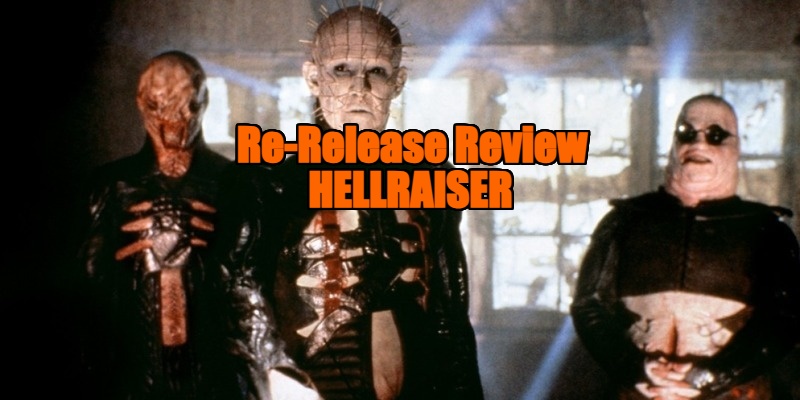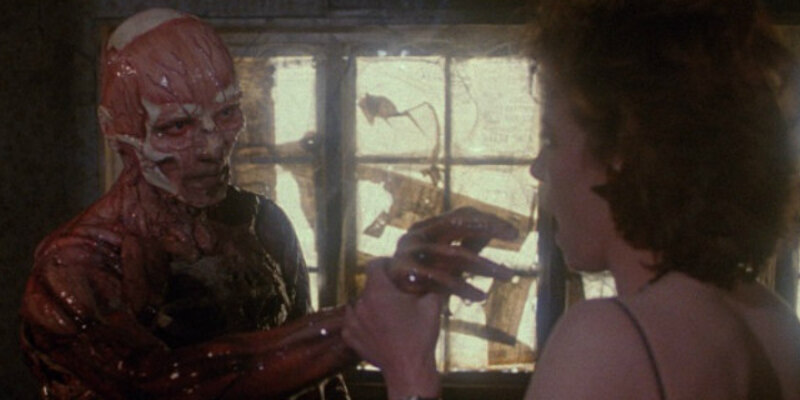
Review by
Eric Hillis
Directed by: Clive Barker
Starring: Andrew Robinson, Clare Higgins, Ashley Laurence, Doug
Bradley, Sean Chapman, Oliver Smith

Newly restored in 4K, Clive Barker's Hellraiser returns to UK cinemas. Shot for a paltry $1 million, the film proved a surprise box office hit on its initial release, spawning multiple sequels (and a reboot) of ever decreasing quality and putting its writer-director firmly on the horror map.
Based on Barker's novella 'The Hellbound Heart', Hellraiser is the story of American businessman Larry Cotton (Dirty Harry's antagonist Andrew Robinson) and his British wife Julia (Clare Higgins), who move into the former's dilapidated family home. Despite a gross infestation of maggots and roaches in the kitchen, Larry is happy to make it their home. Julia isn't so keen until she stumbles across some photographs of Larry's handsome brother Frank (Sean Chapman) engaging in coitus with a series of women. Through flashbacks we learn that Julia was herself one of Frank's lovers, and the look on her face tells us she still holds a candle for the rogue.

Julia dutifully sets about seducing a series of barflys, luring them up to the attic and bludgeoning them so Frank can feast on their blood, becoming a little closer to human with each victim he consumes. Meanwhile, a group of interdimensional S&M freaks, the Cenobites - led by the character we would come to know as Pinhead (Doug Bradley) - are searching for Frank, who is in possession of the Lament Configuration, a puzzle box with the power to open a portal between dimensions.

For the most part, Hellraiser is a gritty, kitchen sink thriller with a very British aesthetic. There are moments of black comedy - Frank's infamous "Jesus wept" line is unforgettable - but Barker plays his sadistic thrills largely straight. At a time when the horror genre was embracing comedy with 'splatstick' sequels to The Texas Chain Saw Massacre, Evil Dead and Nightmare on Elm Street, Barker's film stood out from the crowd with its philosophical musings on the relationship between pleasure and pain, and a commitment to practical FX in service not of cheap grossout gags but rather in the cause of genuine repulsion.
Hellraiser is undoubtedly rough around the edges. Barker admits he was out of his depth in the director's chair, and his direction is as flat as an episode of a UK soap opera, but the dazzling designs of the cenobites go a long way towards making up for the blandness found elsewhere. He does however display an understanding of the psychological impact of minor details - witness how a character's eyes suspiciously change colour, alerting us that something truly horrific has just played out.

Claiming he wanted to become a director to prevent other filmmakers from misinterpreting his work (witness the previous year's adaptation of his short story Rawhead Rex, which I have to admit I adore for all its goofiness), Barker soon admitted the page, rather than the screen, was where his talents lay. Bernard Rose's excellent Candyman would prove Barker's fears unfounded, but while a more experienced filmmaker may have given us a more technically adroit movie than Hellraiser, would it have offered us such an iconic glimpse into the recesses of its creator's arguably deranged mind?

Hellraiser is in UK cinemas for one
night only on September 25th.
